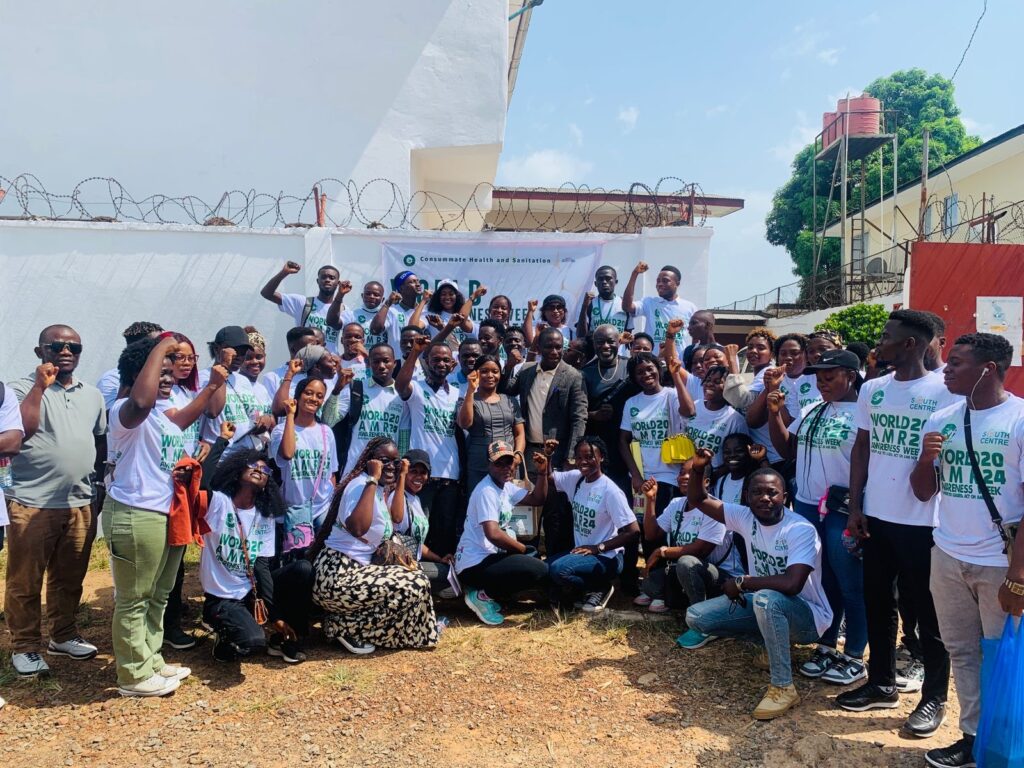Consummate Health and Sanitation, a youth and student organization focused on raising awareness about proper contraceptive use and sanitation, has called on the Government of Liberia and its partners to strengthen commitments to address antimicrobial resistance (AMR).
Speaking during a day-long program commemorating World Antimicrobial Resistance Awareness Week (WAAW) 2024 under the theme “Educate, Advocate, Act Now!”, the organization’s Executive Director, Martin M.N. Forkpah, emphasized the importance of recognizing AMR as a critical issue in Liberia’s national development agenda.
AMR and Liberia’s National Development Agenda
According to Forkpah, AMR poses a severe threat to human and animal health, the economy, and ecosystems, with far-reaching impacts that could hinder Liberia’s achievement of the Sustainable Development Goals (SDGs) by 2030.
“AMR disproportionately affects vulnerable populations, including underprivileged, marginalized, and displaced communities, further straining Liberia’s already fragile health system,” Forkpah stated. He highlighted the global burden of AMR, which causes over 1.2 million deaths annually and contributes to nearly 5 million deaths worldwide.
Without immediate action, Forkpah warned, AMR will exacerbate poverty and inequality in Liberia, deepening vulnerabilities in low- and middle-income countries.
Drivers of AMR and Role of Youth
The Executive Director identified the misuse and overuse of antimicrobials in human health, agriculture, animal husbandry, aquaculture, and untreated pharmaceutical waste as the primary drivers of AMR. He called for youth, communities, and civil society to play a critical role in shaping and implementing Liberia’s response to the crisis.
Ten-Point Action Plan for the Government and Partners
Consummate Health and Sanitation outlined a ten-point action plan to combat AMR in Liberia:
- Set measurable targets to reduce AMR’s burden and spread, ensuring community-led monitoring and transparent progress reporting.
- Promote inclusivity by involving youth, civil society, and communities in AMR governance and decision-making processes.
- Allocate resources for the development, implementation, and monitoring of Liberia’s One Health AMR National Action Plan, focusing on equitable interventions.
- Prioritize vulnerable populations by addressing barriers to healthcare access and ensuring equity in AMR responses.
- Guarantee access to essential services such as safe water, sanitation, vaccines, diagnostics, and effective antimicrobials.
- Encourage innovation by incentivizing the development of rapid diagnostics and treatments while strengthening infection prevention and control.
- Invest in health education, incorporating AMR topics into school curricula and youth-led initiatives, alongside training for health professionals.
- Regulate antimicrobial use in livestock, crops, and aquaculture by banning non-therapeutic applications and enforcing disease prevention protocols.
- Improve waste management by upgrading infrastructure to prevent antimicrobial residues from polluting the environment.
- Raise awareness through culturally relevant campaigns that promote community engagement and behavioral change.
Government’s Response
Speaking on behalf of the government, Dr. Saybah Manyango Payveh, AMR Focal Person at the Ministry of Health, emphasized that AMR is a shared responsibility. She noted that the misuse of antimicrobials has undermined the efficacy of modern medicine, making infections harder to treat.
Dr. Payveh pledged the government’s commitment to working closely with Consummate Health and Sanitation to raise awareness on AMR and proper contraceptive use.
LMHRA’s Standpoint
Representing the Liberia Medicines and Health Products Regulatory Authority (LMHRA), Deputy Director Dr. Teedoh E. Beyslow described AMR as a long-standing problem. He warned that failure to address it would severely affect future generations.
Dr. Beyslow urged youth to take the lead in spreading awareness in their communities and emphasized a collective, holistic approach to combating the crisis.
In his closing remarks, Executive Director Forkpah called for a united, inclusive, and urgent response to AMR, highlighting the essential role of youth and civil society. “Liberia’s response to AMR must be holistic, equitable, and rooted in active participation from all sectors,” he affirmed.
The program concluded with a renewed commitment to combating AMR and fostering a healthier, more resilient Liberia.


